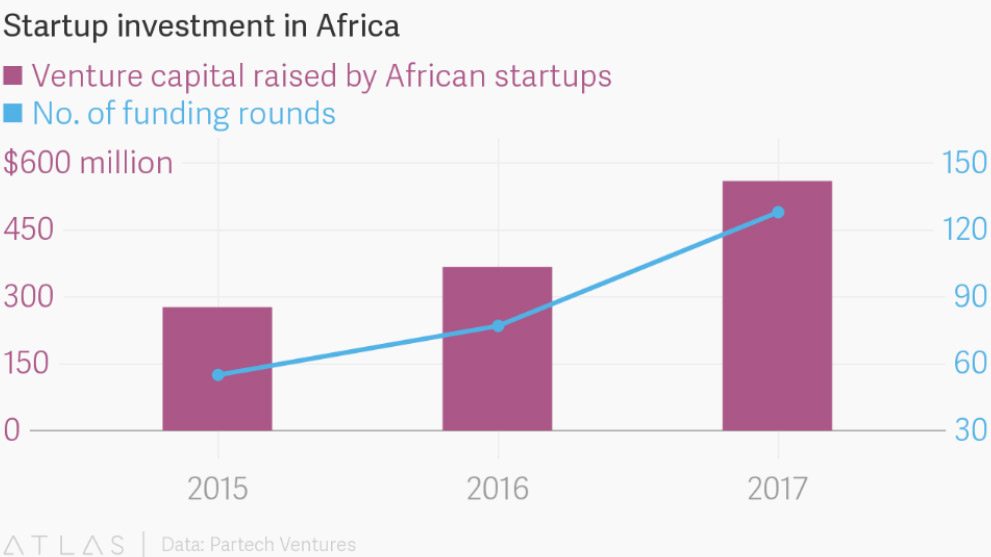
Date: April 23, 2019
At a GDP of $2.2 trillion growing at 3.7%, African economy presents a significant growth opportunity for global businesses. At this rate, most African countries are expected to reach middle income status by 2025. The continent has witnessed a 53% year on year growth in venture capital funding at $560 million in 2017. Wee Tracker’s 2018 investment report describes 2018 as a monumental year with African startups raising $725.6 Million– a 300% increase over the previous year. Clearly, Africa is the go-to destination for many, including India.
India’s trade relations with Africa have been riding the wave as well. Bilateral trade between the countries stood at $63 billion in 2018. Indian exports to Africa and vice-versa have shown sturdy growth rates of 23.6% and 32.2% respectively. Companies from India and Africa are increasingly recognising the growing importance of India-Africa ties. Even the Indian government is working strategically to promote Indo-African trade. In this scenario, it is natural for Indian startups to look at entering African countries.
A McKinsey report has concluded that India can very well quadruple its revenues from Africa to USD 160 billion by 2025 if it increases its presence in key sectors like agriculture, pharmaceuticals, infrastructure, IT etc. Indian startups are set to gain from a large regional market existing in Africa. For Africa also, it will lead to its infrastructural development by way of a growth-led investment.
Here are the top 5 strategies that Indian companies can deploy in order to gain access to African markets successfully –
Distribution is one of the most critical aspect of a company that defines its market presence. By understanding and controlling the geography well, Indian startups will gain from a deep market and customer reach. Africa is a highly fragmented geography and poses a challenge that the Indian startups need to overcome. Having operated in a complex and fragmented geography like
India, this is a challenge many Indian companies have already mastered and hence their experience should help them in entering the African market.
Many products across a wide range of price segments will help a brand connect with all African customer segments. For that, startups will need to innovate and come up with products that deliver value across all segments of customers. This is necessary in order to cover the market and not miss out on catering to Africa’s rising middle class. It is also important to offer ‘aspirational’ products through recognisable brands and packaging to answer the needs of this price-conscious but aspirational segment.
Startups should learn and adapt according to local traditions, markets and customers. A deep understanding of local nuances and beliefs plays a significant role in developing strong product lines, creating effective market communication and strong pricing strategies which suite the African demographic.
It is also necessary to involve locals within the startup team and as regional partners. They provide the local insights that the startups can gain from. They provide an insider perspective on different aspects of business. For example, the local employees in the legal team can assist in developing a good regulatory know-how. Another step in becoming an insider to the local economy is by partnering with the government. Most African governments play an important role in business development and can support companies in gaining in-roads into the African territory.
In the African continent, it is believed that brands play a crucial role in purchase decisions. The African middle class looks for aspirational and affordable products in premium packaging. Hence, irrespective of what sector a startup operates in, they should build their brand aggressively for their unique segment of customers. Brand building can start with deploying local agencies for brand communication efforts. Local agencies have an authentic understanding of local preferences and create communication that speaks to the local audience.
Startups should have a learn-on-the-go strategy. Being in a new geography is bound to bring some shocks and hence companies should create room for them. Start with developing a customised approach based on continuous learning and adaptation. There are no fixed formulae for startup success in any part of the world. This becomes truer for a foreign startup in a far away territory.
Any startup looking to enter the African continent needs to do their homework. India and Africa are quite alike as both are fast growing economies with complex cultures and a rising middle class. By prioritising the best fit country and sector, startups can begin their Africa journey. In essence, startups need to think long term and plan accordingly if they want to set deep roots in the African territory.